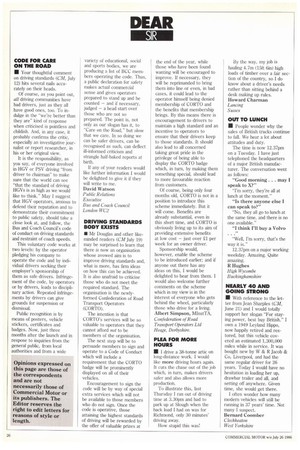CODE FOR CARE ON THE ROAD II Your thoughtful comment
Page 28

If you've noticed an error in this article please click here to report it so we can fix it.
on driving standards (CM, July 12) hits several nails accurately on their heads.
Of course, as you point out, all driving communities have bad drivers, just as they all have good ones, too. To indulge in the "we're better than they are" kind of response when criticised is pointless and childish. And, in any case, it probably confirms the critic, especially an investigative journalist or report researcher, in his or her original view.
It is the responsibility, as you say, of everyone involved in HGV or PSV driving "from driver to chairman" to make sure that the world can see "that the standard of driving HGVs is as high as we would like to think." May I suggest that HGV operators, anxious to defend their reputation and to demonstrate their commitment to public safety, should take a close look at, and follow, the Bus and Coach Council's code of conduct on driving standards and restraint of coach speeds.
This voluntary code works at two levels: by the operator pledging his company to operate the code and by individual drivers seeking their employer's sponsorship of them as safe drivers. Infringement of the code, by operators or by drivers, leads to disciplinary action. Repeated infringements by drivers can give grounds for suspension or dismissal.
Public recognition is by means of posters, vehicle stickers, certificates and badges. Now, just three months after the launch and in respose to inquiries from the general public, from local authorities and from a wide variety of educational, social and sports bodies, we are producing a list of BCC members operating the code. Thus, a public declaration for safety makes actual commercial sense and gives operators prepared to stand up and be counted — and if necessary, judged — a head start over those who are not so prepared. The point is, not only as our slogan has it, to "Care on the Road," but show that we care. In so doing we can be safer drivers, can be recognised as such, can deflect ill-informed criticism and strangle half-baked reports at birth.
If any of your readers would like further information I would be delighted to give it if they will write to me.
David Watson
Public Relations Executive Bus and Coach Council London WC2




















































































































